3 Not-So-Simple Questions, Part II
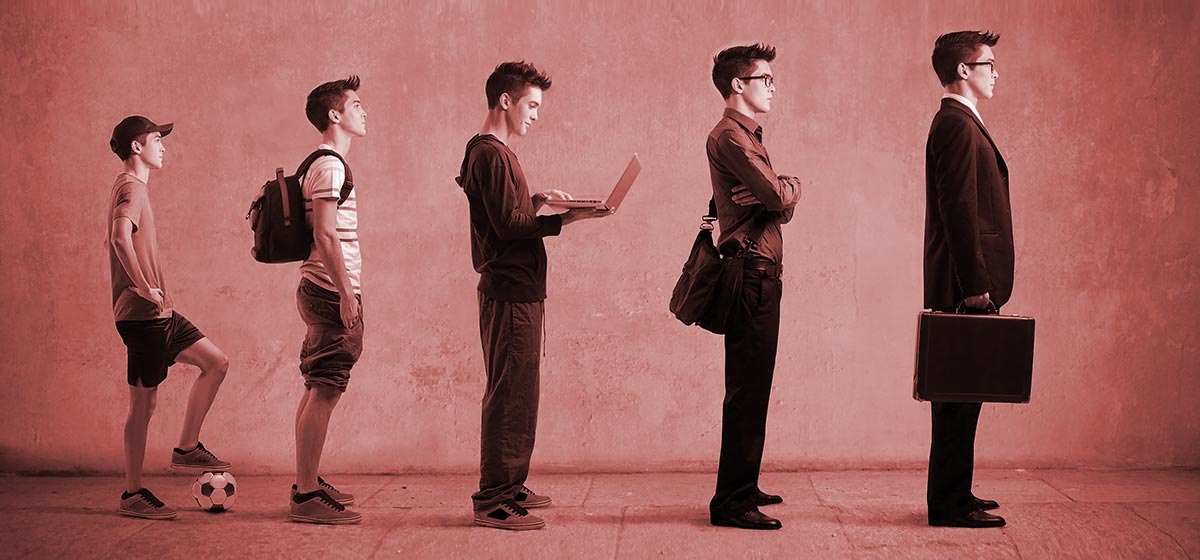
Editor’s note: This is part two of a feature that began in the pages of the Fall issue of Pittsburgh Quarterly. We invited the heads of the region’s top independent schools to address three important questions, in 200 words or less for each. The first of the questions is below, along with the answers. For the second and third questions and answers, please visit pittsburghquarterly.com in the next two weeks.
How are the political tensions of our country being reflected in
your school community and how are you addressing these issues?

Gary J. Niels, Head of School, Winchester Thurston School
Over the last decade or so, the U.S. political climate has become more polarized, and children are more exposed than ever through omnipresent media channels. The WT community is respectful and open, but we aren’t immune to the tensions. So, in addition to teaching the principles and history of democracy, and the impact of sociopolitical movements, we must help students think logically and critically, and talk and act with empathy. WT works to construct an environment that allows multiple voices. Before the 2016 presidential election, we hosted local leaders of all political parties to share their platforms. The morning after the election, we facilitated an optional open forum for students to share their thoughts. Such interactions must be guided by experienced facilitators who are knowledgeable about diversity. We hired a nationally respected Director of Equity & Inclusion to lead our effort to maintain a community that seeks not agreement, but understanding. Our democracy depends upon a common willingness and ability to engage in dialogue, which occurs only with thoughtful planning, reflection, and learning. We cannot change our divided political climate, but within that context, we teach students to engage in respectful dialogue, and we graduate students who have learned to seek understanding.

Macon Finley, Head, The Ellis School
The Ellis School prides itself on being a community in which diverse opinions are celebrated and respected. Ellis girls are encouraged from an early age to express their ideas and beliefs confidently, without fear of judgment, and to listen with an open mind to their fellow students, especially those with whom they might disagree. One of the core values of the school is to “pursue, support, and embrace diversity of all kinds, recognizing the collective strength derived from our individual differences.” We believe greater learning happens when we are not just surrounded by others who think and believe as we do. Last year’s election, and the current political climate, has provided rich opportunities for engaging conversations in and out of the classroom. Our work with students has focused on exploring what it means to live in a democracy, what it means to think critically and form your own opinions based on facts and research, and what it means to be a positive force for change in the world. As an all-girls school, we are particularly committed to helping each girl find her authentic voice, discover her passions, and reach her full, unique potential.
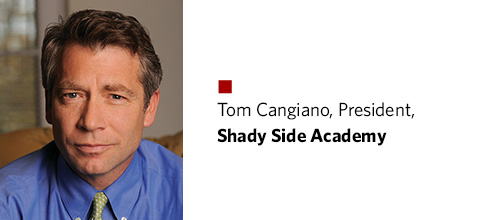
Tom Cangiano, President, Shady Side Academy
In the lead-up to and the immediate aftermath of the 2016 election, we saw some students struggle with maintaining dispassionate, high-level conversations about political issues. This situation was exacerbated by the incendiary rhetoric of a presidential race that was so unlike presidential races in recent history. Throughout election season, we have always encouraged our students to engage in political conversations, but to do so in a way that is respectful, thoughtful and informed. And being informed is particularly challenging given the propensity of people to get news from their own ideologically slanted sources, particularly on social media. We ask our students to apply the same intellectual rigor and academic honesty that they would use in understanding any issue or making any argument. Students must not only have a firm understanding of their own arguments, but they must make every effort to fully understand the positions of those who have a different take on issues. Having a purely ideological take on key issues is frequently an intellectually lazy take on the issues.

Justin Zimmerman, Headmaster, The Linsly School
The political tension in our country has created healthy debate and discourse within our school community. At The Linsly School, we have focused our attention on finding ways to listen, respect each other, and have healthy and appropriate conversations, especially when opposing views are represented. Students know that within our community they can safely and freely express their opinions as long as they do it in respectful and proper ways. Honestly, the ongoing political discourse creates valuable teaching and learning opportunities and helps deepen the classroom learning experience for our students. Students at Linsly are encouraged to think, ask questions, and to form and clearly articulate their own opinions regarding political issues.

Katherine M. Titus, Head of School, Mercersburg Academy
Mercersburg Academy is a welcoming and accepting place that believes that all political viewpoints should be heard and respected. As the national culture has shifted to one that has no tolerance for differing opinions, Mercersburg is committed to instigating opportunities for debate and civil discourse. Educating our students on how to thoughtfully support their opinions while also considering alternative perspectives is not only critical to the mission of our school but also vital to the future of our world. We seek to be a community of learners who are open, patient, and carefully articulate—arbiters of conflict and defenders of truth. As such, we offer a broad and robust curriculum that examines and frames contemporary issues alongside historical ones and host an annual series that invites speakers and experts of national and international renown to our campus to interact with our students. In addition, our summer reading for the upcoming year focuses specifically on creating a culture of civil discourse, which will frame classroom conversations as well as this year’s speaker series.
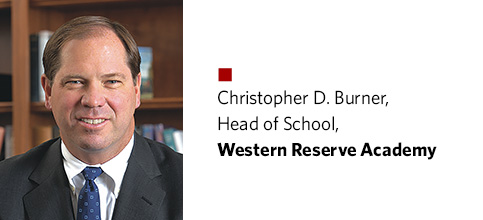
Christopher D. Burner, Head of School, Western Reserve Academy
Our students are attuned to current events, including politics. Last year, our class president worked for an elected official in Ohio and another student lobbied for procedural change that would allow 17-year-olds to vote. Our government classes are very popular, and we have clubs representing the entire political spectrum. Student government and other leadership opportunities are abundant, and designed to teach lessons in democracy, but also leadership skills like tolerance, focus, cooperation, humility and integrity. Because of our diverse student body, representing 15 countries and 24 states, we have broad global perspectives in our small community of 400 students. This diversity provides opportunities for students to become global thinkers, enriching their political perspectives and cultural understanding.
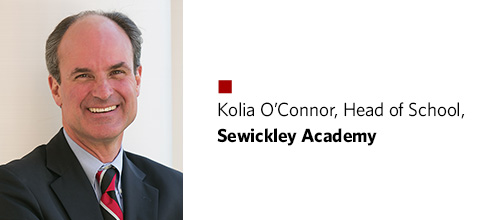
Kolia O’Connor, Head of School, Sewickley Academy
President Franklin Delano Roosevelt once said, “Democracy cannot succeed unless those who express their choice are prepared to choose wisely. The real safeguard of democracy, therefore, is education.” Our most recent presidential election has certainly seemed to divide rather than bring together, and unfortunately, that division has come at the expense of citizens researching, knowing, and understanding the issues before they vote. This election has offered schools an excellent opportunity to engage our students in discussions about our government and political processes. Through our core value of diversity, we are dedicated to being a community that represents and celebrates different backgrounds, talents, interests, and divergent yet informed opinions. The role of schools is to help inform our students of the facts of the issues in order for them to be prepared to choose wisely.
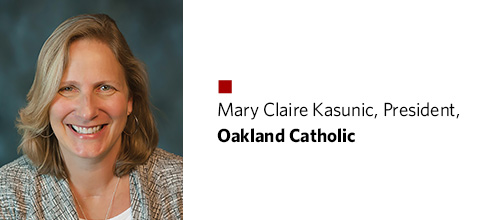
Mary Claire Kasunic, President, Oakland Catholic
During a period in our country’s history when political tensions are elevated, Oakland Catholic High School has optimized its academic approach to examine, study, and analyze the words, actions, and decisions being made by government officials on many levels. Although tension is frequently viewed as a negative, it has brought about a positive increase in political awareness among students and highlighted the role that all schools play in developing informed and responsible citizens who are capable of separating truth from fiction, formulating opinions grounded in facts, and recognizing the value of strong leadership. Social Studies instructors continue to draw from current events, but learning about the effect of politics on all aspects of society brings discussions to Literature, Foreign Language, Art, and Religion classes as well. Edmodo and other tech platforms have served as convenient ways to share global perspectives on politically driven issues occurring both in the States and abroad; a recent Young Women’s Leadership tour of Italy put the developing role of female leadership into the context of the current political atmosphere; GCI (Global Competence Initiative) has served students well by providing broader context to news items broadcast in the U.S.



